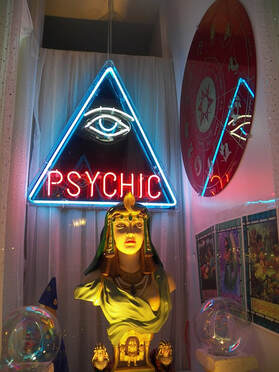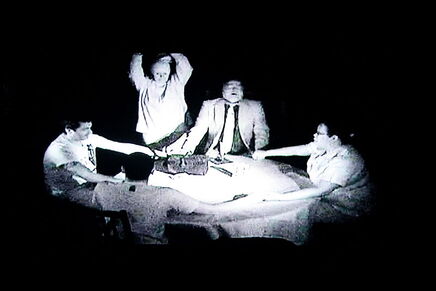|
10/24/2019 Can Believers and Skeptics Agree on Something When It Comes to the Supernatural?Read Now When it comes to the supernatural, believers and skeptics have a set of seemingly irreconcilable differences. Religious believers claim that faith healers can make miraculous healings happen. Believers in psychic phenomena claim that things like extrasensory perception (ESP) are real. Believers in spiritualism claim that the spirits of the dead can be contacted by individuals with special powers such as mediums. Skeptics however, point out that every time such occurrences have been investigated thoroughly, no evidence for their existence has been found. The disagreement between believers and skeptics has led to a lot of acrimony peppered with plenty of throwing up of hands, shaking of heads, and rolling of eyes. Can’t believers and skeptics agree on some things?  Seance Seance I think they can. For one thing, the vast majority of both believers and skeptics would agree that it is not ethical or moral for a fake faith healer, or psychic, or medium to deprive people of their hard-earned money through lies and trickery. There are many examples of such fakes. Many mediums in the United States in the 1920s were exploiting people’s pain over losing loved ones, tricking them into thinking they could communicate with their spirits. In the 1980s many psychics such as James Hydrick deceived people into believing they had supernatural powers. During this time period, the televangelist Peter Popoff was also active tricking people into believing he could cure them of their ailments through the power of God. In the 2000s psychics like Rosemary Altea fooled people into believing she could communicate with their dead relatives. In the 2010s, the psychic Maria Duval and her associates tricked as many as 1.4 million American, most of them elderly and sick, into sending money by mail in exchange for psychic help to heal their ailments or improve their economic situation. If a person is promised a service such as contacting their dearly departed, or the healing of a malady, finding love, improving their economic situation, or a peek into their future in exchange for their money, then said person is entitled to receive just what they were promised. This is a very basic and straightforward principle based on universal common sense notions of honesty. But this just leads us to the cause of the acrimony between believers and skeptics. By which procedure do we determine whether a faith healer, a psychic, or a medium is honest or fake in a manner that will be accepted by both sides? I don’t know a definite answer to this question, but I do have a suggestion regarding how stringent the procedure should be. Let me build my case for it. Let’s start with Penn and Teller. These guys are a fantastic duo of magicians. They have been in the business for decades. They have a huge knowledge regarding how magic is performed, and not only do they perform amazing tricks, but they also invent new ones. Penn and Teller have a show called “Fool Us” where they invite the best magicians in the world to try to fool them. In other words, to try to perform a magic trick for them that they can’t figure out how it’s done. Despite their experience and their knowledge, Penn and Teller have been fooled quite a number of times by other magicians such as Rebecca Herrera as shown in the video below. I am a scientist and a skeptic, and I consider myself smart. However, for the life of me I cannot figure out even how some of the most mediocre magicians do their tricks, let alone Penn and Teller or other world class magicians. However, as long as a trick is limited to its magic context, there is no problem. It’s all wonder, fun, and games. But in the moment a trick is removed from this context and performed as part of a séance, a psychic demonstration, or a faith healing event under the pretense that it is not a trick but a bona fide supernatural event, that is where the problem arises. Imagine if the magician Rebecca Herrera featured in the video above used her talents to try to convince people that she really has supernatural abilities. It would be too easy. We are all accustomed to dealing with nature, and nature does not lie, but when it comes to dealing with dishonest tricksters, the truth is that the vast majority of people are sitting ducks. When individuals witness things they cannot explain, many will be inclined to accept the reality of these things and jettison skepticism out the window, which will soon be followed by their money. This is especially true in the case of the most vulnerable such as those who have lost loved ones, or are facing difficult family situations, or are experiencing health problems. There are literally thousands of ways in which a dishonest person can fool others into believing they have supernatural powers. This often involves using very basic techniques to obtain information such as “cold reading” coupled to other more elaborate tricks such as those described in the video below from The Real Hustle series. Nowadays with the advent of the internet it is even easier to obtain personal information from individuals and present it as having been obtained by supernatural means. The performance of these tricks is safer for the performer if they are carried out within a religious context. This is due to the fact that any miracle that didn’t work can be blamed on weak faith. There are several people who have deserted the faith healing profession and they have revealed many of the tricks they use to dupe believers. In the video below by Derren Brown you can check some of them. So now let me get to my suggestion. Without suggesting to believers that ALL faith healers, psychics, or mediums are fake, I nevertheless want to posit that, because it is virtually impossible for regular folks like you or me to tell the difference between a trick and the real thing, you should set the bar for accepting that the powers of these characters is real very, very high. I would even recommend that before believing, you should get help from someone in the magical profession to identify any tell-tale signs of cheating. Do not try to do this yourself! Fake faith healers, psychics, or mediums can have decades of experience deceiving people. They will use their tricks, manipulate your emotions, and fool you. This is especially true if you WANT to believe. If we accept that there are liars and cheats out there, displaying skepticism is not a weakness in your capacity to believe or your faith. Rather it signals that you are prudent and discriminating in your beliefs, which is a good thing to be. Psychic picture from Pixabay is in the public domain. Séance scene from “Weird of What?” by Sgerbic is used here under an Attribution-ShareAlike 3.0 Unported (CC BY-SA 3.0) license.
2 Comments
|
Details
Categories
All
Archives
June 2024
|
 RSS Feed
RSS Feed